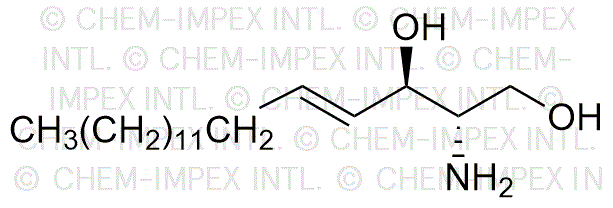D-Sphingosine is widely utilized in research focused on
- Cell Signaling: It plays a crucial role in cellular signaling pathways, making it valuable for studies on cell growth, differentiation, and apoptosis.
- Neuroscience: Researchers use D-Sphingosine to explore its effects on neuronal health and neurodegenerative diseases, providing insights into potential therapeutic targets.
- Pharmaceutical Development: It is a key component in the formulation of lipid-based drug delivery systems, enhancing the bioavailability of various therapeutic agents.
- Cosmetic Industry: D-Sphingosine is incorporated into skincare products for its moisturizing properties and ability to strengthen the skin barrier, appealing to consumers seeking effective skincare solutions.
- Biotechnology: In the production of sphingolipid-based biomaterials, it serves as a building block for creating innovative materials with applications in tissue engineering and regenerative medicine.
General Information
Properties
Safety and Regulations
Applications
D-Sphingosine is widely utilized in research focused on
- Cell Signaling: It plays a crucial role in cellular signaling pathways, making it valuable for studies on cell growth, differentiation, and apoptosis.
- Neuroscience: Researchers use D-Sphingosine to explore its effects on neuronal health and neurodegenerative diseases, providing insights into potential therapeutic targets.
- Pharmaceutical Development: It is a key component in the formulation of lipid-based drug delivery systems, enhancing the bioavailability of various therapeutic agents.
- Cosmetic Industry: D-Sphingosine is incorporated into skincare products for its moisturizing properties and ability to strengthen the skin barrier, appealing to consumers seeking effective skincare solutions.
- Biotechnology: In the production of sphingolipid-based biomaterials, it serves as a building block for creating innovative materials with applications in tissue engineering and regenerative medicine.
Documents
Safety Data Sheets (SDS)
The SDS provides comprehensive safety information on handling, storage, and disposal of the product.
Product Specification (PS)
The PS provides a comprehensive breakdown of the product’s properties, including chemical composition, physical state, purity, and storage requirements. It also details acceptable quality ranges and the product's intended applications.
Certificates of Analysis (COA)
Search for Certificates of Analysis (COA) by entering the products Lot Number. Lot and Batch Numbers can be found on a product’s label following the words ‘Lot’ or ‘Batch’.
Numéro de catalogue
Numéro de lot/série
Certificates Of Origin (COO)
This COO confirms the country where the product was manufactured, and also details the materials and components used in it and whether it is derived from natural, synthetic, or other specific sources. This certificate may be required for customs, trade, and regulatory compliance.
Numéro de catalogue
Numéro de lot/série
Safety Data Sheets (SDS)
The SDS provides comprehensive safety information on handling, storage, and disposal of the product.
DownloadProduct Specification (PS)
The PS provides a comprehensive breakdown of the product’s properties, including chemical composition, physical state, purity, and storage requirements. It also details acceptable quality ranges and the product's intended applications.
DownloadCertificates of Analysis (COA)
Search for Certificates of Analysis (COA) by entering the products Lot Number. Lot and Batch Numbers can be found on a product’s label following the words ‘Lot’ or ‘Batch’.
Numéro de catalogue
Numéro de lot/série
Certificates Of Origin (COO)
This COO confirms the country where the product was manufactured, and also details the materials and components used in it and whether it is derived from natural, synthetic, or other specific sources. This certificate may be required for customs, trade, and regulatory compliance.

